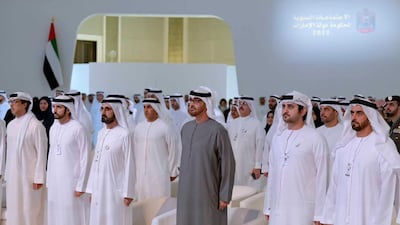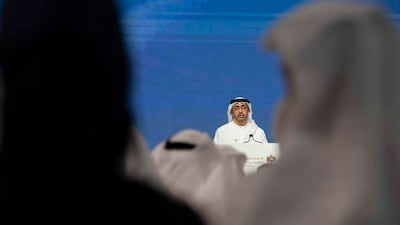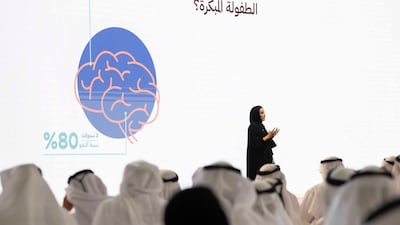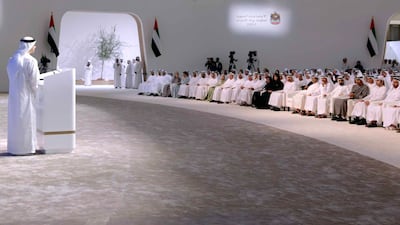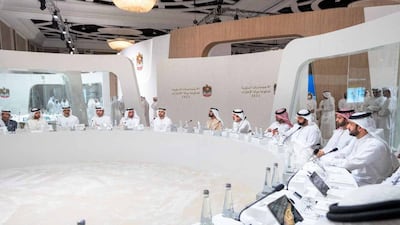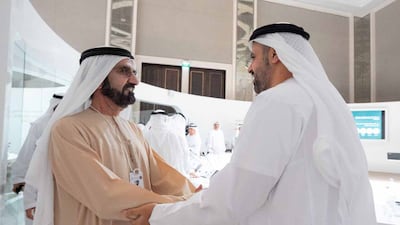President Sheikh Mohamed on Wednesday said education remains a key priority for the UAE, following the second day of meetings of senior officials in Abu Dhabi.
The annual gathering, which yesterday saw the UAE outline its vision for the next 10 years, put a particular focus on the future of education, legal reform and a strong economy.
“Today at the UAE Government Annual Meetings I attended a session discussing the future of education, which remains one of our key strategic priorities,” said Sheikh Mohamed in a tweet.
“By harnessing innovation and investing in our people, the UAE’s journey of progress will continue.”
Sheikh Mohammed bin Rashid, Prime Minister and Ruler of Dubai, said today's sessions mapped out a clear plan for the future of education.
“My brother Mohamed bin Zayed Al Nahyan witnessed today a part of the annual meetings of the UAE government. The education sessions with Sheikh Abdullah bin Zayed and ministers were clear [and] transparent and they drew up an integral map for the education system,” said Sheikh Mohammed.
“Education will remain a priority in the vision of the President of the country, with the efforts of a specialised government team and with an active and interactive educational field and with a society of parents who contribute to bringing up a generation that takes us to new future horizons.”
Village upgrades
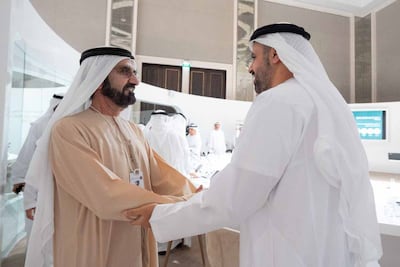
Separately, Sheikh Mohammed said the UAE had launched a plan to upgrade villages across the country as part of an initial Dh1 billion ($272 million) investment in jobs and tourism.
The project is aimed at developing a sustainable development model and creating economic and business opportunities in rural areas.
“I also witnessed, as part of the annual meetings, the launch of project 'Emirates villages', which aim at upgrading Emirati villages in terms of development and tourism,” he said in a tweet.
“The first group of villages will provide 500 economic projects for their youth.
“The budget of the project is one billion dirhams. It is led by the head of the Emirates Council for Balanced Development [Sheikh] Theyab bin Mohamed bin Zayed.”
The board was established in February at a cabinet meeting to help shape projects to develop the regions and villages of the UAE.
Sheikh Theyab said the project introduced a sustainable development model that would serve all regions across the country through partnerships between the government, private sector and local communities.
He said the project included five developmental tracks through which the Emirates Council for Balanced Development will create a micro-economy in 10 villages.
Importance of education
Sheikh Mohamed has repeatedly stressed the UAE’s commitment to investing in education, which he has said is an important factor in determining the extent to which countries advance in terms of their development and civilisation.
In an address to teachers in October, Sheikh Mohamed said: “Dedicated teachers are the bedrock of our education system and will be at the forefront of its development.”
The UAE in May announced a shake-up at the Ministry of Education, with new ministers chosen to improve education at all levels.
In June, the ministers set out a plan to overhaul government-run schools, investing in teachers and encouraging parents to become more involved in how their children are taught.
There will also be a renewed focus on maths and science taught in English from a young age, ministers told a media briefing in Dubai.

Emiratisation, economy and digital tech among topics
Education, Emiratisation, national economy, digital technology and other topics related to the UAE’s comprehensive development plans were discussed on the second day of the UAE government's annual meetings.
Future directions in education
The session on education focused on key future directions for the sector and the potential challenges it faces, with contributions from members of the Education and Human Resources Council (EHRC), including Ahmad Al Falasi, Minister of Education, Sarah Al Amiri, Minister of State for Public Education and Future Technology, Shamma Al Mazrui, Minister of State for Youth, and Sara Musallam, Minister of State for Early Education.
Comprehensive economic partnerships
Abdulla bin Touq, Minister of Economy, and Dr Thani Al Zeyoudi, Minister of State for Foreign Trade, discussed the importance of the UAE’s comprehensive economic partnerships and their pivotal role in enhancing the efficiency, agility and strength of the national economy.
They also addressed the key pillars of the state’s future directions and economic plans over the next stage, the main objectives of economic and trade agreements with several countries worldwide and their impact on the UAE’s comprehensive development march.
Emiratisation ... new policies and mechanisms
Abdulrahman Al Awar, Minister of Human Resources and Emiratisation, and Ghannam Al Mazrouei, Secretary General of the Emirati Talents Competitiveness Council, discussed the latest government policies, mechanisms and strategies in Emiratisation.
They highlighted national goals that were achieved and emphasised the importance of this vital area that is given high priority by the leadership and is fundamental to the UAE’s development march.
Digital economy and future technologies
Omar Al Olama, Minister of State for Digital Economy, AI and Remote Working System, highlighted the efforts of the UAE and its vision in building a pioneering digital economy that combines exceptional skills with the latest advanced technology.
The session addressed the importance of the country’s vision in enhancing economic diversification and consolidating a prosperous economy based on future technology.

Government work and cybersecurity challenges
Mohamed Al Kuwaiti, head of cybersecurity in the UAE government, discussed the importance of maintaining cybersecurity in government work, the most prominent elements of achieving cybersecurity, and the importance of the cybersecurity system in achieving one of the goals of ‘We The UAE 2031’, to make the UAE one of the top three countries in the world in the cybersecurity index.
Accelerating the employment of university graduates
Five sessions were held during the UAE government's annual meetings, one of which discussed supporting mechanisms to ensure the accelerated integration of university and college graduates into the UAE labour market.
Increasing Emirati workforce in new economic sectors
Methods and mechanisms to increase the number of Emiratis and national companies in new economic sectors were discussed.
He said that national companies were a major driver of economic growth based on a flexible and diversified approach, which motivates Emiratis and the youth to raise their participation in the development of new projects.
Job opportunities for Emiratis in the legal sector and national consultancy
The session discussed mechanisms to support career opportunities for Emiratis in the legal sector and national consultancy, in accordance with the objectives of the Federal Law on the Regulation of the Legal Profession.
Meeting the requirements of Emiratisation
The annual meetings featured a session devoted to discussing the priority given in government contracts to private companies that meet Emiratisation requirements. The session discussed best practices for ensuring that contracts are given to companies that meet Emiratisation requirements.
The meetings constitute a national platform for bringing together all government entities at federal and local levels to discuss current challenges, strategies and initiatives that will lead the country on the path to achieve the Centennial 2071 Plan.
